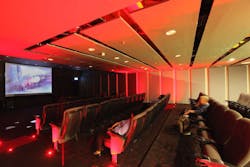July 08--Imagine killing time at your local airport terminal by checking out the latest Brad Pitt action flick or giggling through the new Sandra Bullock comedy.
Nearly half of the 10,000 travelers questioned in a recent survey say they would like to see a movie theater added to their local airport. But aviation industry experts say it's a trend that won't be taking off in the U.S. any time soon.
The survey by the travel search website Skyscanner found that 49% of those questioned said a feature they would like to see at their airport is a movie theater. Thirty-six percent wanted sleeping pods, 32% a library, 31% a park and 30% a vanity area, according to the survey.
But space is tight at airports, and a full-size theater would not be cost effective unless ticket prices were raised to obnoxious levels, experts said.
"The economics of providing a movie theater in a U.S. airport are unfavorable," said Bob Hazel, an aviation partner at Oliver Wyman, a New York management consulting firm. "Airport construction is just about the most expensive form of construction there is."
He noted that movie theaters have been added at a few airports in Asia but are probably not profitable.
Los Angeles International Airport is nearly finished adding 1 million square feet of ticket counters, security checkpoints, passenger lounges and expanded customs and immigration facilities. But airport officials said they did not consider adding a movie theater.
"I don't see how airports in the U.S. with all the space constraints can add a movie theater without charging a lot," said airport spokeswoman Nancy Castles.
But there are alternatives for bored travelers. The international terminal at LAX includes a shop that rents DVDs. The airport is also working to expand the number of power outlets so passengers won't run out of juice while catching a flick on their mobile device, she said.
Grouse all you want about how long it takes to move through airport security lines, but there may be a good reason for the wait: Screening agents are trained to be slow and thorough.
A study by Duke University found that screeners for the Transportation Security Administration are slower at performing visual searches than amateurs -- but are more accurate.
The study, which was partially funded by the Department of Homeland Security, suggests that the experience TSA agents gain from searching for weapons and explosives in luggage makes them slower and more methodical at performing visual searches.
The university's psychology and neuroscience department gave 206 TSA agents and 93 university students a visual search test. The two groups were asked to find the letter "T" on computer screens littered with images of "L" shapes. Some of the screens did not include "T" letters so the researchers could gauge accuracy.
The university students had an accuracy rate of 82%, while the TSA agents had a rate of about 88%. But the nonprofessionals were faster, completing the task in less than 4 seconds, while the TSA agents took more than 6 seconds, on average, the study found.
The study's conclusion: TSA agents are slower because they are more systematic about how they search for weapons and bombs.
TSA "officers effectively and efficiently screen nearly 2 million passengers per day, relying on a variety of techniques to ensure the safe transportation of passengers," TSA spokesman David A. Castelveter said in response to the study.
But how accurate are TSA agents at finding weapons and bombs at the airports?
The TSA won't discuss error rates on tests performed on airport screeners. But a TSA report released in 2007 said security screeners at Los Angeles International Airport missed 75% of fake bombs and explosives that passed through the airport.
TSA officials said they continue to improve the training of its officers.
Copyright 2013 - Los Angeles Times

